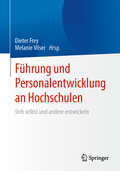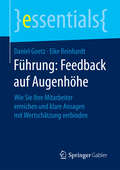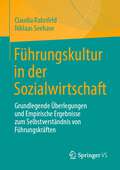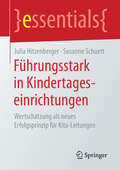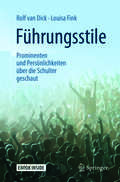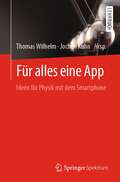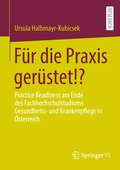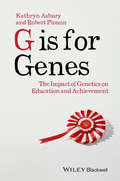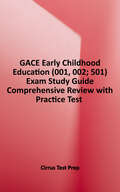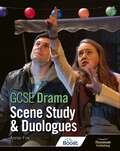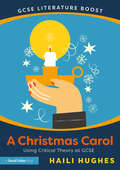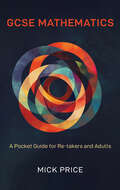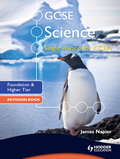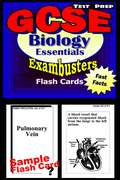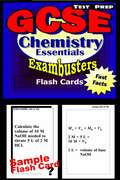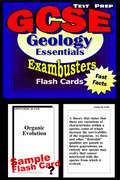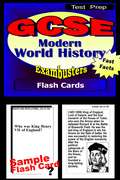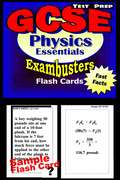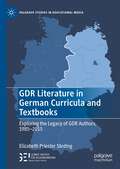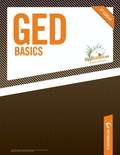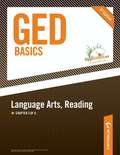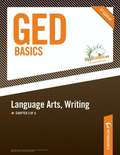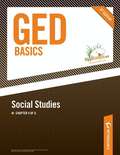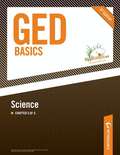- Table View
- List View
Führung und Personalentwicklung an Hochschulen: Sich selbst und andere entwickeln
by Dieter Frey Melanie VilserDer Hochschulalltag befindet sich im Wandel und stellt Führungskräfte und Mitarbeitende vor neue Herausforderungen. Dieses Buch vermittelt wertvolle psychologische Erkenntnisse, um diesen Herausforderungen zu begegnen. Dabei beantwortet es Fragen wie z.B.: Wie führt man? Wie schafft man Synergieeffekte in Teams? Wie wählt man gute Mitarbeitende aus? Wie führt man Mitarbeiter*innengespräche? Welche Feedbackkultur fördert Potenziale bestmöglich? Wie geht man mit Stress um? Basierend auf Trainings- und Beratungswissen für LMU Mitarbeitende erhalten Sie in diesem Buch langjährig erprobte alltagstaugliche Hinweise zum Aufbau wichtiger Kompetenzen wie Selbstführung, Mitarbeiter*innenführung, Personalauswahl und -entwicklung, Zeit- und Selbstmanagement, Stressmanagement und Achtsamkeit. Zielgruppen:Das Buch richtet sich an wissenschaftliche Mitarbeitende jeder Karrierestufe in Bildungseinrichtungen, an Professor*innen, Postdoktorand*innen wie auch Doktorand*innen. Im Mittelpunkt steht die kompakte Zusammenfassung des Kernwissens für eine gesunde und erfolgreiche Entwicklung der eigenen Potenziale sowie der Potenziale von Mitarbeiter*innen und Studierenden. Zu den Herausgeber*innen:Prof. Dr. Dieter Frey ist Leiter des LMU Center for Leadership and People Management und Mitglied der Bayrischen Akademie der Wissenschaften. Dr. Melanie Vilser ist wissenschaftliche Mitarbeiterin und Trainerin am LMU Center for Leadership and People Management.
Führung: Wie Sie Ihre Mitarbeiter erreichen und klare Ansagen mit Wertschätzung verbinden (essentials)
by Daniel Goetz Eike ReinhardtWie sage ich es klar und wertsch#65533;tzend? - Darauf gibt dieses essential eine handhabbare und praxisnahe Antwort. Es zeigt, wie Sie als F#65533;hrungskraft konstruktives Feedback geben, das Anerkennung und Wertsch#65533;tzung vermittelt. Feedback ist ein gemeinsamer Austauschprozess von Geber und Nehmer: Es muss ,,ankommen", um wirkungsvoll zu sein. Ausgangspunkt f#65533;r professionelles Feedback ist daher immer die Haltung und Klarheit des Feedbackgebers. Die Autoren vermitteln, wie Sie Feedback als Instrument nicht nur f#65533;r die pers#65533;nliche Entwicklung von Mitarbeitenden, sondern auch f#65533;r Wandel und Wachstum im Unternehmen nutzen k#65533;nnen.
Führungskultur in der Sozialwirtschaft: Grundlegende Überlegungen und Empirische Ergebnisse zum Selbstverständnis von Führungskräften
by Claudia Rahnfeld Niklaas SeehaseDas Buch beschreibt theoretisch und empirisch das Selbstverständnis von Führungskräften hinsichtlich ihrer Führungsrolle in der Sozialen Arbeit. Grundlegende Überlegungen zum Selbstmanagement und der Selbstführung von Führungskräften in der Sozialwirtschaft werden in einem ersten Teil ausführlich dargestellt. In einem zweiten Teil werden empirische Daten einer deutschlandweiten Befragung, in der über 500 Führungskräfte befragt wurden, Einblick in das Selbstverständnis von Leitungskräften in der Sozialen Arbeit geben. Die empirische Datenbasis lässt dabei auch erkennen, wie Führungskräfte Reflexionsprozesse gestalten und wie sie Entscheidungsfindungsprozesse steuern. Zudem wird ein empirischer Einblick in die Konflikt- und Fehlerkultur von sozialen Organisationen gegeben.
Führungsstark in Kindertageseinrichtungen: Wertschätzung als neues Erfolgsprinzip für Kita-Leitungen (essentials)
by Susanne Schuett Julia HitzenbergerDieses essential unterstützt Kita-Leitungen bei der Bewältigung der Belastungen am Arbeitsplatz Kita, die heute eine besondere Führungsstärke brauchen, um ihre Mitarbeiter/-innen, betreuten Kinder und Eltern durch die Wertschätzungskrise zu führen. Nach dem neuen Erfolgsprinzip „Mit Wertschätzung zu Wertschöpfung“ zeigen wir fünf konkrete Schritte, wie Kita-Leitungen ihre Mitarbeiter/-innen binden, qualifizieren, gesund erhalten, motivieren und zufriedenstellen – für eine Verbesserung des „Lebens und Arbeitens“ und der frühpädagogischen Qualität in Krippe, Kindergarten und Hort.
Führungsstile: Prominenten und Persönlichkeiten über die Schulter geschaut
by Rolf Van Dick Louisa FinkIn einer Zeit, die von Wandel und Veränderung geprägt ist, ist gute Führung entscheidend für den Erfolg – von Unternehmen, aber auch in der Politik oder im Sport. Aber wie sieht gute Führung aus?Der Leser bekommt mit diesem Buch exklusive Einblicke in die Praxis der Führung – nicht nur in Unternehmen, sondern in viele gesellschaftliche Bereiche: Von Kirche und Kunst über Journalismus und Militär bis zur Politik. Rolf van Dick hat mit herausragenden Menschen gesprochen, die in ihren Bereichen zu anerkannten Führungspersönlichkeiten zählen. Dazu gehören der Dalai Lama, Sara Wagenknecht, Birgit Prinz, Wolfgang Niedecken oder Günter Grass oder der ehemalige Bundespräsident Roman Herzog. Im Gespräch ist er diesen Persönlichkeiten – oft in ihrem Zuhause – nahe gekommen und hat faszinierende Geschichten gehört. Dieses Buch bietet eine inspirierende Auswahl der spannendsten Gespräche, in denen immer der Frage nach den ganz persönlichen Führungsstilen der Interviewpartner nachgegangen wird. Von der provokanten Frage angefangen, ob Führung überhaupt notwendig ist, diskutiert Rolf van Dick mit seinen Gesprächspartnern, warum Führung häufig schief geht, worauf es im 21. Jahrhundert ankommt und welche Werte für den Erfolg Aktualität haben. Auch die Frage, ob man Führung lernen kann oder dafür „geboren“ sein muss, wird sehr vielfältig beantwortet.Das Werk liefert Einsichten und bietet Anregungen sowohl für erfahrene Manager, als auch an Führung interessierten Einsteigern die eine Inspiration für ihren (Führungs-)Alltag suchen.
Für alles eine App: Ideen für Physik mit dem Smartphone
by Jochen Kuhn Thomas WilhelmFür alles eine AppWelche Apps eignen sich, um Smartphone oder Tablet für physikalische Untersuchungen und Betrachtungen zu nutzen? Diese Frage stellen sich physikalisch Interessierte genauso wie Lehrkräfte. Dieses Buch gibt einen schnellen und umfassenden Überblick über geeignete Apps und stellt anhand vieler Praxisbeispiele dar, wie man Smartphone und Tablet physikalisch nutzen kann.Die Autorinnen und Autoren gehen auf unterschiedlichste Anwendungen ein: Sie reichen von vorgefertigten Simulationen über physikalische Spiele bis hin zu Augmented Reality-Anwendungen, bei denen virtuelle Objekte in das Bild der realen Welt eingeblendet werden. Zudem werden Apps vorgestellt, mit denen Messdaten mit den internen Sensoren oder externen Zusatzgeräten erfasst, von einer Datenbank abgerufen oder durch die Verwendung der Foto- und Videokamera gewonnen werden.In jedem einzelnen Abschnitt wird eine andere App kurz und überblicksweise vorgestellt und deren Verwendbarkeit für physikalische Untersuchungen in Schule und/oder Hochschule und/oder zur eigenen Unterhaltung an einem Beispiel erläutert. Zunächst gibt es eine App-Kurzbeschreibung und Informationen zu Technik und Handhabung. Es folgt die Beschreibung eines physikalischen Anwendungsbeispiels. Die Abschnitte sind nach klassischen Themenbereichen der Physik geordnet.Die Leserinnen und Leser werden nach der Lektüre• einen Überblick haben, welche vielfältigen physikalischen Anwendungen mit mobilen Geräten möglich sind,• viele verschiedene Apps kennengelernt haben,• zu physikalischen Spielereien mit mobilen Geräten motiviert sein,• Anregungen kennen, wie man mobile Endgeräte in der physikalischen Lehre einsetzen kann.
Für die Praxis gerüstet!?: Practice Readiness am Ende des Fachhochschulstudiums Gesundheits- und Krankenpflege in Österreich
by Ursula Halbmayr-KubicsekBei dem vorliegenden Band handelt es sich um eine qualitative Evaluationsstudie des Studienganges Gesundheits- und Krankenpflege an österreichischen Fachhochschulen.Der Pflegeberuf hat sich in den letzten Jahrzehnten weiterentwickelt und an Komplexität zugenommen. Um diesen Anforderungen gerecht zu werden, benötigen Pflegende unterschiedliche Kompetenzen und Fertigkeiten. Im Rahmen der generalistischen Pflegeausbildung an den Fachhochschulen sollen die Studierenden innerhalb von sechs Semestern diese gesetzlich geforderten Kompetenzen erlernen, um eine Practice Readiness zu entwickeln. Ziel dieses Forschungsprojektes war die qualitative Evaluierung hinsichtlich der Practice Readiness der Absolventinnen und Absolventen. Es fanden qualitative Befragungen von Studierenden der Pflege, Führungspersonen im basalen und mittleren Pflegemanagement sowie Berufseinsteigerinnen und -einsteiger statt. Aus diesen unterschiedlichen Perspektiven konnte die Practice Readiness der Fachhochschulabsolventinnen und -absolventen dargestellt werden.
G is for Genes: The Impact of Genetics on Education and Achievement (Understanding Children's Worlds #24)
by Robert Plomin Kathryn AsburyG is for Genes shows how a dialogue between geneticists and educationalists can have beneficial results for the education of all children—and can also benefit schools, teachers, and society at large. Draws on behavioral genetic research from around the world, including the UK-based Twins’ Early Development Study (TEDS), one of the largest twin studies in the world Offers a unique viewpoint by bringing together genetics and education, disciplines with a historically difficult relationship Shows that genetic influence is not the same as genetic determinism and that the environment matters at least as much as genes Designed to spark a public debate about what naturally-occurring individual differences mean for education and equality
G.U.I.D.E. Differentiated Instruction for Christian Educators
by Beth AckermanGuide to Differentiated Instruction for Christian Educators addresses how the Great Commission and teaching are unified through differentiated instruction. Teachers need to reach all students, including the diverse and struggling learners. Beth Ackerman encourages teachers and provides strategies for implementing differentiated instruction in their classroom.
GACE Early Childhood Education (001, 002; 501) Exam Study Guide: Comprehensive Review With Practice Test Questions for the Georgia Assessments for the Certification of Educators
by CirrusThis guide will provide the user/s with a detailed overview of the GACE, so the user knows exactly what to expect on test day. This will take the user through all the concepts covered on the test and allow testing of the knowledge with practice questions. It consists of two multiple-choice tests designed to assess whether the user possess the knowledge and skills necessary to become an early childhood educator in Georgia. Each test consists of seventy-five questions, and the user has a maximum of two hours to complete each. You may complete both tests in one session or elect to take them individually. This guide will help the user master the most important test topics and also develop critical test-taking skills. The features built into the books prepare the user for the tests and increase their score. Along with a detailed summary of the test’s format, content, and scoring, the book offers an in-depth overview of the content knowledge required to pass the test. The sidebars provide interesting information, highlight key concepts, and review content so that the user can solidify their understanding of the exam’s concepts.
GCSE Drama: Scene Study and Duologues
by Annie FoxWritten by a highly experienced and respected Drama teacher and Author, Annie Fox, this comprehensive resource offers detailed guidance on how to approach performing duologues for the GCSE Drama course. It aims to help students have the most positive possible experience of performing duologues, from choosing ones that suits their skills, supporting their rehearsals and trouble-shooting common problems.- Provides guidance on how to select a duologue, including the choice of character, content and genre.- Includes a large selection of exemplar duologues for performance practice, each with a summary of the setting and characters, as well as notes to aid in understanding and breaking down the scene.- Offers advice and tips on how to rehearse and troubleshoot common issues such as forgetting lines and ensuring students demonstrate a range of skills.- Covers a wide range of genres and styles, including the horror thriller Let the Right One In, the friendship drama Out of Love and the hilarious fantasy comedy, Alice.- Supports all GCSE Drama specifications including AQA, OCR, Edexcel and WJEC/Eduqas, and offers high-quality support you can trust.
GCSE Literature Boost: Using Critical Theory at GCSE (GCSE Literature Boost)
by Haili HughesGCSE Literature Boost: A Christmas Carol uses academic criticism and theory to relight your literary passion for this classic text and put a newfound excitement in your pedagogy. Beginning with a whistlestop tour of literary theory and criticism from 400BC to the late 20th century, Hughes explains how you can introduce your GCSE English students to themes most often reserved for undergraduate courses, improving their understanding of the text and broadening their knowledge of the subject as a whole.Written in easily digestible chunks, each chapter considers a main theme or section of Charles Dickens‘ A Christmas Carol through different critical lenses summarising the relevant academic theories, and shows how you can transfer this knowledge to the classroom through practical teaching ideas. Features include: Case studies showing how English teachers have used academic theory in practical ways. Ideas for teaching linked to GCSE assessment objectives at the end of each chapter. Six key points at the end of each chapter that highlight the key takeaways from that chapter. Real examples of student work which can be used as models and exemplars. This is essential reading for all secondary English teachers looking to create a climate of high expectations and improve their students’ knowledge and understanding of the big ideas in literature.
GCSE Mathematics - A Pocket Guide for Re-takers and Adults
by Mick PriceAs its title suggests, this book by been devised by author Mick Price as an essential guide for those revisiting Mathematics at GCSE level. Crafted from years of experience and class-tested materials, it serves as a unique revision tool, tailored for both FE college students and adults seeking to improve their previous grades or refresh long-forgotten knowledge. Stripping back the complexities of mathematics, this book focuses on the fundamentals needed to achieve a grade 4, without overwhelming its readers with the entirety of KS4 content. GCSE Mathematics promises accessibility and convenience, making it an indispensable companion for both classroom learning and self-study. Inside, you’ll find a blend of theoretical essentials, practical real-life examples, and exercises designed for both younger and more mature learners, all presented in a straightforward, uncondescending manner. GCSE Mathematics is not just a book: it’s a tool for success, always within reach.
GCSE Science Single Award for CCEA: Foundation and Higher Tier Revision Book
by James NapierHelp your students perfect their understanding and prepare for examinations with accessible science content presented at the right level. An accessible Revision Guide that completely covers the most recent specification with up-to-date revision questions. Written by best-selling authors with substantial examining experience at both Foundation and Higher level for CCEA. - Ensures students' understanding with clear worked examples and content written at the correct level - Provides practice for assessment with lots of Revision Questions - Enables students to improve their grade with helpful exam tips that covers key terminology and guidance on preparing for assessment - Helps students to practise and remember key terms with a full Glossary
GCSE Test Prep Flash Cards: Biology Essentials (Exambusters GCSE Workbook #2)
by Ace Inc.<P><P><i>Advisory: Bookshare has learned that this book offers only partial accessibility. We have kept it in the collection because it is useful for some of our members. Benetech is actively working on projects to improve accessibility issues such as these.</i><P><P> 450 questions and answers. Essential definitions and concepts. <P><P>Topics: Cells, Biochemistry and Energy, Evolution and Classification, Kingdoms: Bacteria, Fungi, Protista; Kingdom: Plantae, Kingdom: Animalia, Human Locomotion, Human Circulation and Immunology, Human Respiration and Excretion, Human Digestion, Human Nervous System, Human Endocrinology, Reproduction and Development, Genetics, Ecology <P> Exambusters GCSE Prep Workbooks provide comprehensive GCSE review--one fact at a time--to prepare students to take practice GCSE tests. Each GCSE study guide focuses on fundamental concepts and definitions--a basic overview to begin studying for the GCSE exam. Up to 600 questions and answers, each volume in the GCSE series is a quick and easy, focused read. Reviewing GCSE flash cards is the first step toward more confident GCSE preparation and ultimately, higher GCSE exam scores!
GCSE Test Prep Flash Cards: Chemistry (Exambusters GCSE Workbook #3)
by Ace Inc.<P><P><i>Advisory: Bookshare has learned that this book offers only partial accessibility. We have kept it in the collection because it is useful for some of our members. Benetech is actively working on projects to improve accessibility issues such as these.</i><P><P> 700 questions and answers. Essential definitions, formulas, concepts, and sample problems. <P><P>Topics: Introduction, Matter, Atoms, Formulas, Moles, Reactions, Elements, Periodic Table, Electrons, Chemical Bonds, Heat, Gases, Phase Changes, Solutions, Reaction Rates, Equilibrium, Acids and Bases, Oxidation and Reduction, Introduction to Organic Chemistry, Radioactivity <P> Exambusters GCSE Prep Workbooks provide comprehensive GCSE review--one fact at a time--to prepare students to take practice GCSE tests. Each GCSE study guide focuses on fundamental concepts and definitions--a basic overview to begin studying for the GCSE exam. Up to 600 questions and answers, each volume in the GCSE series is a quick and easy, focused read. Reviewing GCSE flash cards is the first step toward more confident GCSE preparation and ultimately, higher GCSE exam scores!
GCSE Test Prep Flash Cards: Geology (Exambusters GCSE Workbook #1)
by Ace Inc.<P><P><i>Advisory: Bookshare has learned that this book offers only partial accessibility. We have kept it in the collection because it is useful for some of our members. Benetech is actively working on projects to improve accessibility issues such as these.</i><P><P> 600 questions and answers. Essential definitions and concepts.<P><P> Topics: Calculations, Earth's Origin, Save Our Planet, Minerals, Rocks, Weathering, Groundwater, Running Water, Glaciers, The Changing Crust, The Oceans, Maps, The Atmosphere, Wind, Weather Patterns, Introduction to Astronomy <P> Exambusters GCSE Prep Workbooks provide comprehensive GCSE review--one fact at a time--to prepare students to take practice GCSE tests. Each GCSE study guide focuses on fundamental concepts and definitions--a basic overview to begin studying for the GCSE exam. Up to 600 questions and answers, each volume in the GCSE series is a quick and easy, focused read. Reviewing GCSE flash cards is the first step toward more confident GCSE preparation and ultimately, higher GCSE exam scores!
GCSE Test Prep Flash Cards: Modern World History (Exambusters GCSE Workbook #8)
by Ace Inc.<P><P><i>Advisory: Bookshare has learned that this book offers only partial accessibility. We have kept it in the collection because it is useful for some of our members. Benetech is actively working on projects to improve accessibility issues such as these.</i><P><P> 600 questions and answers. Essential names, dates, and summaries of key historical events. <P><P>Topics: Ancient Egypt and Asia, Ancient Greece, Ancient Rome, Early Asia, Evolution of Religion, Middle Ages, Early Modern Times, Colonial Empires, Rights and Revolutions, Nationalism, Imperialism and World War I, Between the World Wars, World War II, The United Nations, The Cold War, 19th-20th Century Japan, Contemporary Age, Contemporary Africa, Contemporary Latin America, Contemporary Eurasia, Into The New Millennium <P> Exambusters GCSE Prep Workbooks provide comprehensive GCSE review--one fact at a time--to prepare students to take practice GCSE tests. Each GCSE study guide focuses on fundamental concepts and definitions--a basic overview to begin studying for the GCSE exam. Up to 600 questions and answers, each volume in the GCSE series is a quick and easy, focused read. Reviewing GCSE flash cards is the first step toward more confident GCSE preparation and ultimately, higher GCSE exam scores!
GCSE Test Prep Flash Cards: Physics (Exambusters GCSE Workbook #4)
by Ace Inc.<P><P><i>Advisory: Bookshare has learned that this book offers only partial accessibility. We have kept it in the collection because it is useful for some of our members. Benetech is actively working on projects to improve accessibility issues such as these.</i><P><P> 600 questions and answers. Essential definitions, formulas, concepts, and sample problems. <P><P>Topics: Measurement, Motion and Forces, Work and Energy, Heat and Gases, Atoms, Fluids, Sound, Light and Optics, DC Circuits, Magnetism, AC Circuits <P> Exambusters GCSE Prep Workbooks provide comprehensive GCSE review--one fact at a time--to prepare students to take practice GCSE tests. Each GCSE study guide focuses on fundamental concepts and definitions--a basic overview to begin studying for the GCSE exam. Up to 600 questions and answers, each volume in the GCSE series is a quick and easy, focused read. Reviewing GCSE flash cards is the first step toward more confident GCSE preparation and ultimately, higher GCSE exam scores!
GDR Literature in German Curricula and Textbooks: Exploring the Legacy of GDR Authors, 1985-2015 (Palgrave Studies in Educational Media)
by Elizabeth Priester StedingThis book analyzes the changing portrayal of GDR literature in German Gymnasium textbooks 1985-2015. Addressing the need for textbook research to broaden its focus from GDR history to GDR literature, the author presents case studies of well-known GDR authors (Bertolt Brecht, Johannes R. Becher, Anna Seghers, Wolf Biermann, and Christa Wolf), each examining a particular aspect of the societal discourse about GDR literature and the tension between (literary) text and (historical) context. Taken together, the case studies reveal the frequently underestimated power of ideology in literature textbooks. They also show how attempts to package these authors into simplified categories ultimately reveal the profound complexities of the GDR literary legacy. By examining the clear tension between literature and politics in textbooks and curricula, the author demonstrates how ideological messages are transmitted in all textbooks, as well as the importance of attending to overt and covert ideology.
GED Basics
by Peterson'sPeterson's GED Basics provides a quick and thorough way for students to prepare for their GED exam. This essential GED test-prep guide includes hundreds of practice questions, along with subject review and expert test-taking tips on how to score high on each GED test. Readers can quickly find pertinent information about the GED--where to take it, what's on the test, how the test is scored, when results are sent, and if one can take the GED more than once. GED Basics offers readers: * Test-taking tips and subject review for each GED Test--Language Arts, Reading; Language Arts, Writing (Parts I and II); Social Studies; Science; and Math (Parts I and II) * Hundreds of exercises and practice test questions for each GED test--with detailed answer explanations to help you score high on the GED. Need extra subject help in math, social studies, or science? In the Social Studies, Science, and Math chapters of GED Basics, readers will see easy-to-use links to HippoCampus.org, an innovative Web site where interactive subject help is offered via high-quality multimedia lessons and course content. HippoCampusTM is a project of the Monterey Institute for Technology and Education (MITE), supported by The William and Flora Hewlett Foundation, and designed as part of Open Education Resources (OER).
GED Basics: Chapter 2 of 6
by Peterson'sPeterson's GED Basics: Language Arts, Reading offers test-taking tips, subject review, exercises, and practice test questions to help a reader score high on the GED Language Arts, Reading Test. Readers will benefit from the review of nonfiction, commentary, fiction, drama, and poetry, along with the numerous practice questions and detailed answer explanations. The Test Yourself section can help you see if you are prepared to take this test of the GED or if additional review is needed. In addition, "Answering Your Questions about the GED" offers answers to commonly asked questions about the GED--where to take the test, what's on the test, how the test is scored, when results are sent, if one can take the GED more than once--and more.
GED Basics: Chapter 3 of 6
by Peterson'sPeterson's GED Basics: Language Arts, Writing offers test-taking tips, subject review, exercises, and practice test questions to help a reader score high on Parts I and II of the GED Language Arts, Writing Test. Readers will benefit from the thorough review of: * Writing a complete sentence * Subject-Verb agreement * Sentence Fragments * Run-on Sentences * Word choice * Sentence structure * Grammar review * Punctuation review * Writing the essay The Test Yourself sections will help you see if you are prepared to take this test of the GED or if additional review is needed. In addition, "Answering Your Questions about the GED" offers answers to commonly asked questions about the GED--where to take the test, what's on the test, how the test is scored, when results are sent, if one can take the GED more than once--and more.
GED Basics: Chapter 4 of 6
by Peterson'sPeterson's GED Basics: Social Studies offers test-taking tips, subject review, exercises, and practice test questions to help a reader score high on the GED Social Studies Test. Readers will benefit from the review and practice exercises of the following areas: * Geography * Behavioral science * Economics * Political science * History The Test Yourself section will help you see if you are prepared to take this test of the GED or if additional review is needed. In addition, "Answering Your Questions about the GED" offers answers to commonly asked questions about the GED--where to take the test, what's on the test, how the test is scored, when results are sent, if one can take the GED more than once--and more. Need extra help in history? In GED Basics: Social Studies, readers will see easy-to-use links to HippoCampus.org, an innovative Web site where interactive subject help is offered via high-quality multimedia lessons and course content. HippoCampusTM is a project of the Monterey Institute for Technology and Education (MITE), supported by The William and Flora Hewlett Foundation, and designed as part of Open Education Resources (OER). GED Basics: Social Studies is a chapter of GED Basics, which offers test-taking tips, subject review, and practice test questions for each GED Test--Language Arts, Reading; Language Arts, Writing (Parts I and II); Social Studies; Science; and Math (Parts I and II).
GED Basics: Chapter 5 of 6
by Peterson'sPeterson's GED Basics: Science offers test-taking tips, subject review, exercises, and practice test questions to help a reader score high on the GED Science Test. Readers will benefit from the review and practice exercises of the following areas: * Life science * Earth and space science * Chemistry * Physics The Test Yourself section will help you see if you are prepared to take this test of the GED or if additional review is needed. In addition, "Answering Your Questions about the GED" offers answers to commonly asked questions about the GED--where to take the test, what's on the test, how the test is scored, when results are sent, if one can take the GED more than once--and more. Need extra help in science? In GED Basics: Science, readers will see easy-to-use links to HippoCampus.org, an innovative Web site where interactive subject help is offered via high-quality multimedia lessons and course content. HippoCampusTM is a project of the Monterey Institute for Technology and Education (MITE), supported by The William and Flora Hewlett Foundation, and designed as part of Open Education Resources (OER). GED Basics: Science is a chapter of GED Basics, which offers test-taking tips, subject review, and practice test questions for each GED Test--Language Arts, Reading; Language Arts, Writing (Parts I and II); Social Studies; Science; and Math (Parts I and II).
